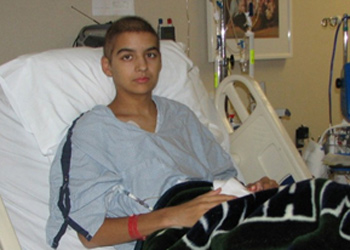Promising immunotherapy addresses lack of effective treatments for deadly brain tumors
Media Contact: Tiffani Copeland
Vice President, Campaign Development & Communications
CureSearch for Children’s Cancer
Email: tiffani.copeland@curesearch.org
Phone: (800) 458-6223
Bethesda, MD – March 30, 2020 – CureSearch for Children’s Cancer has committed $2.5 million to fund a first-in-human, phase I/II clinical trial testing an innovative personalized immunotherapy for pediatric high-grade gliomas, the primary cause of death in children with brain tumors. The CureSearch Catapult Award was granted to Pediatric Oncologist Elias Sayour, MD, PhD at the University of Florida who will partner with the Pacific Pediatric Neuro-Oncology Consortium to enroll patients at 18 different institutions across the U.S. beginning this summer.
High-grade gliomas, including anaplastic astrocytoma and glioblastoma, are among the most devastating pediatric cancer diagnoses with a median survival of less than two years. The current standard of care involves surgery, radiation therapy and some combination of chemotherapy. There has not been a significant improvement in survival in decades.
Like a flu vaccine, which takes pieces of the flu virus and activates the immune system against them, Dr. Sayour’s technique takes pieces of a tumor’s genetic material and activates the immune system to identify and destroy that tumor. If high-grade glioma, a hard-to-treat tumor type, is responsive to this immunotherapy, the treatment will likely translate to other pediatric and adult solid tumors as well.
“Dr. Sayour’s preclinical work is extraordinary, and if successful, the implication for treating all solid tumors is nothing short of groundbreaking,” said Kay Koehler, CureSearch President & CEO. “Unfortunately, this is the type of innovative project that often goes unfunded in the current research landscape. Our goal is to fill that funding gap and ensure that the most promising projects advance quickly to the clinic to help all children diagnosed with cancer.”
“Pediatric cancers are unique entities that mandate new research avenues and development of novel targeted therapies. While funding exists for new discoveries, little to no funding infrastructure is in place for catalysis and development of these discoveries into first-in-human clinical trials,” said Dr. Sayour. “I can think of no other foundation primarily focused in funding the developmental work necessary to bring forward new discoveries into groundbreaking clinical trials for the heroic children battling cancer.”
Dr. Sayour is an assistant professor in the Lillian S. Wells Department of Neurosurgery and the department of pediatrics in the UF College of Medicine, and principal investigator of the RNA Engineering Laboratory within UF’s Preston A. Wells, Jr. Center for Brain Tumor Therapy.
As part of CureSearch’s growing co-funding model, this project is supported in part by the Resonance Foundation for Children’s Health, co-founded by Sheri Sobrato Brisson and Eric Brisson, and by the Rally Foundation for Childhood Cancer Research.
For more information about Dr. Sayour and his research, read University of Florida Health Communications press release.
About CureSearch for Children’s Cancer
CureSearch for Children’s Cancer, a national nonprofit organization based in Bethesda, MD, works to end childhood cancer by driving targeted and innovative research with measurable results in an accelerated time frame. CureSearch focuses on advancing the strongest research out of the laboratory and into clinical trials and development, where better, less-toxic treatments can quickly help children.
CureSearch Catapult Awards support high impact, clinic-ready projects as part of an overall research strategy focused on moving new treatments quickly to clinic, reaching patients in need today while potentially changing the standard of care for all patients across the globe.
For more information, visit curesearch.org, follow CureSearch on Twitter @curesearch or join the conversation on Facebook at facebook.com/curesearch.
About Pediatric Brain Tumors and High-Grade Gliomas
Brain tumors are the most common cause of pediatric cancer death. Gliomas originate from glial cells which support and nourish neurons in the brain and are classified as either low-grade or high-grade based on how likely they are to grow and spread. Low-grade gliomas usually are slow growing and stay in a local area of the brain. High-grade gliomas grow and spread aggressively and are the primary cause of death in children with brain tumors. Median survival in high-grade glioma is less than two years.
Want more stories like this?
Get emails that matter, when it matters.



